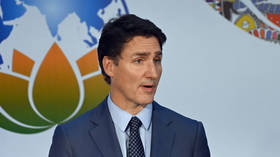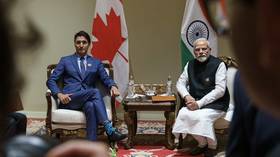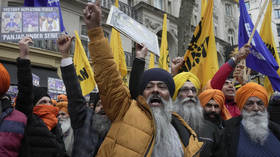Canada denies trying to provoke India

Canada was not trying to provoke India when it accused it of being linked to the murder of a Sikh separatist leader, but wanted New Delhi to take the issue seriously, Prime Minister Justin Trudeau said on Tuesday.
According to Reuters, Trudeau emphasized the gravity of the case, asserting that it carries profound implications for international law. He stated that “the government of India needs to take this matter with the utmost seriousness. We are doing that; we are not looking to provoke or escalate."
His remarks came amid a rapidly unfolding diplomatic row over Canada’s accusations against India for allegedly being involved in the assassination of Sikh separatist leader Hardeep Singh Nijjar in Canada in June of this year. India designated Nijjar a "terrorist" in 2020.
Earlier in the day, New Delhi strongly rejected Canada’s allegations, terming them “absurd and motivated.”
Trudeau on Monday sparked a diplomatic standoff when he layed out in a speech before the Canadian parliament what he called “credible allegations” that the Indian government had assassinated the Sikh independence activist in Ontario earlier this year, although he provided no evidence.
Later, Canadian Foreign Minister Melanie Jolie announced the immediate expulsion of a senior Indian diplomat whom she identified as the head of India's foreign intelligence agency, the Research and Analysis Wing, AFP reported. Hours later, India responded with a symmetrical move.
According to Indian media reports, New Delhi expelled the Canadian intelligence agency station chief in India, Olivier Sylvestere, who was given five days to leave the country.A senior Canadian government source told Reuters that the evidence of India’s alleged involvement in the killing of Nijjar "will all be shared in due course.” The government source also told Reuters that Canada has worked very closely with the US on the issue, including on Trudeau's statement on Monday. Statements expressing “deep concerns” over Canada’s allegations against India were issued by the UK, Australia, and US.
India’s Ministry of External Affairs responded to Canada’s allegation in strong diplomatic language, voicing New Delhi’s growing concern “at the interference of Canadian diplomats in our internal matters and their involvement in anti-India activities.”
Meanwhile, Sikh organizations in Canada welcomed Trudeau's move. Speaking at a press conference in Ottawa on Tuesday, World Sikh Organization of Canada President Mukhbir Singh called on the Trudeau government to take swift action, including identifying and bringing to justice those behind the murder of Nijjar, protecting Sikhs in Canada, and conducting a “thorough review” of Indian diplomats and officials in Canada, as well as stopping intelligence data sharing with New Delhi.
Canada boasts a substantial Sikh population. According to various Indian authorities, there are small factions within this community that still espouse the idea of an independent Sikh state, called the Khalistan movement.
Hours after India announced its retaliatory move of expelling a Canadian diplomat on Tuesday, the Canadian Embassy in New Delhi was reportedly shut and local employees were promptly instructed to vacate the premises, the news agency IANS reported, citing sources.
The report also noted that in an email all embassy employees had been asked not to speak to the media or post anything on social media. The diplomatic mission refused to comment on the development when contacted by the agency.
Despite threats to India and its diplomats issued by pro-Khalistan activists, New Delhi has been concerned by what it sees as “inaction” against extremist Sikh groups. India perceives these groups as a security threat both domestically and abroad and has raised these issues with the governments of Canada, the UK, US, and Australia. With Canada, the issue was discussed as recently as this month when Indian and Canadian leaders met on the sidelines of the G20 summit in New Delhi.














